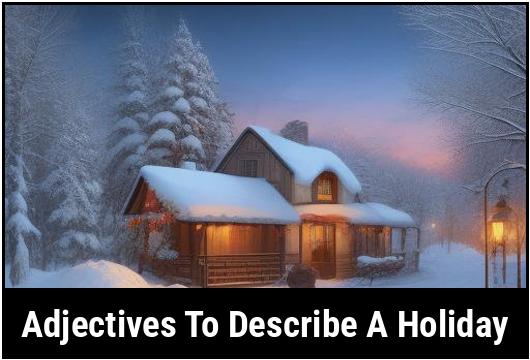- You are here:
- Home »
- adjectives
- » Adjectives To Describe A Holiday

Adjectives To Describe A Holiday
When we think about a holiday, the images that come to mind are often filled with vivid and sensory experiences. From the serene white sandy beaches to the bustling and vibrant cityscapes, holidays offer a diverse range of experiences that can be difficult to encapsulate in mere words. This is where adjectives play a pivotal role in conveying the essence and feel of a holiday. In this comprehensive guide, we will delve into the world of adjectives and how they can be effectively used to describe the different facets of a holiday experience.
Key Takeaways
- Adjectives are essential in providing color, depth, and vibrancy to the description of a holiday.
- The right choice of adjectives can elicit strong emotional responses and create vivid imagery in the minds of the readers.
- Various types of adjectives can be used to capture different aspects of a holiday, including the destination, activities, ambiance, and overall experience.
Adjectives To Describe A Holiday
Categories of Adjectives
To better organize the extensive list of adjectives, we will categorize them into four groups: Atmospheric, Relaxing, Adventurous, and Cultural.
Atmospheric Adjectives
-
Breathtaking: Leaving one awe-inspired and amazed by the beauty of the surroundings.
Example: The sunset over the ocean was breathtaking, leaving us in complete awe.
-
Serene: Characterized by peace, tranquility, and a calm atmosphere.
Example: We found a serene spot on the mountainside and enjoyed the silence.
-
Enchanting: Full of charm, as if under a magical spell.
Example: The small, enchanting village was straight out of a fairytale.
-
Vibrant: Filled with energy, excitement, and a lively atmosphere.
Example: The vibrant city streets were alive with music and laughter.
-
Picturesque: Resembling a picture; visually appealing.
Example: The quaint, picturesque town offered countless opportunities for photography.
Relaxing Adjectives
-
Tranquil: Calm and peaceful, allowing for complete relaxation.
Example: The tranquil beach provided the perfect escape from our busy lives.
-
Soothing: Providing comfort, relief, and a sense of calmness.
Example: The gentle sound of waves crashing against the shore was incredibly soothing.
-
Idyllic: Perfectly suited for relaxation, with an atmosphere of paradise.
Example: The idyllic resort nestled in the tropical rainforest was pure bliss.
-
Rejuvenating: Restoring vitality and energy through relaxation.
Example: The spa treatment was incredibly rejuvenating, leaving us refreshed.
-
Blissful: A state of pure happiness, contentment, and joy.
Example: The luxurious, all-inclusive resort offered a truly blissful experience.
Adventurous Adjectives
-
Thrilling: Providing excitement, adrenaline rushes, and a sense of adventure.
Example: The bungee jumping experience was absolutely thrilling.
-
Exhilarating: Invigorating, with a feeling of immense joy and excitement.
Example: The hike to the mountaintop resulted in an exhilarating and breathtaking view.
-
Daring: Bold and courageous, involving risk and a sense of adventure.
Example: Our daring safari allowed us to get up close and personal with wild animals.
-
Unforgettable: Leaving a lasting impression due to its unique and thrilling nature.
Example: The unforgettable scuba diving experience introduced us to a whole new world.
-
Electrifying: Filled with excitement, energy, and thrilling activities.
Example: The city’s electrifying nightlife captivated us until the early hours of the morning.
Cultural Adjectives
-
Authentic: Reflecting the true essence and traditions of a particular culture.
Example: The local street market offered an authentic glimpse into the city’s culture.
-
Traditional: Related to long-established customs and practices of a culture.
Example: We participated in a traditional dance workshop, immersing ourselves in the local culture.
-
Rich: Abundant in cultural significance and heritage.
Example: The museum displayed a rich collection of artifacts from ancient civilizations.
-
Fascinating: Captivating and engrossing, arousing interest in a particular culture.
Example: The guided tour of the ancient ruins was incredibly fascinating.
-
Colorful: Vivid and vibrant, characterized by an array of colors and cultural diversity.
Example: The cultural festival showcased a colorful variety of traditional costumes and music.
Why Use Adjectives To Describe A Holiday
Describing a holiday using adjectives serves as a powerful tool to transport the reader to the destination, evoking the ambiance, emotions, and sensory experiences associated with that particular holiday. Instead of merely stating that a holiday destination is "beautiful," the use of descriptive adjectives allows us to convey a wealth of information, painting a vivid mental picture and eliciting emotional responses. Consider the impact of comparing a "serene, azure beach" with a "bustling, lively city center" – the difference is significant, and it is this evocative power that makes adjectives an indispensable component of holiday descriptions.
How To Choose The Right Adjective To Describe A Holiday
Selecting the appropriate adjectives to describe a holiday involves carefully considering the specific attributes, ambiance, and experiences associated with the destination. Begin by immersing yourself in the memories and emotions evoked by the holiday. Take into account the landscapes, climate, culture, and activities that define the holiday experience. Once you have a clear understanding of these aspects, consider the emotional response you want to evoke in your audience. Do you want them to feel a sense of tranquility, excitement, awe, or nostalgia? By aligning the adjectives with the intended emotional impact, you can effectively convey the essence of the holiday experience.
Types Of Adjectives For Describing A Holiday
Descriptive Adjectives Based On Destination
-
Serene: This adjective is often used to evoke a sense of peace, calm, and tranquility, making it suitable for describing serene countryside getaways or secluded tropical islands.
-
Bustling: Ideal for capturing the lively and vibrant atmosphere of urban destinations, "bustling" conveys the energy and dynamism of city life.
-
Picturesque: When a destination is visually charming and captivating, "picturesque" aptly describes the scenic beauty and idyllic landscapes, conjuring images of charming villages or breathtaking natural vistas.
-
Untouched: For remote and unspoiled locations, "untouched" conveys the pristine and unaltered allure of such destinations, often associated with wilderness and natural beauty.
-
Majestic: This adjective portrays grandeur and magnificence, encapsulating the awe-inspiring and majestic landscapes such as snow-capped mountains or vast canyons.
Adjectives Describing Climate And Environment
-
Balmy: Evoking a sense of mildness and pleasant warmth, "balmy" describes the soothing and agreeable climate of tropical and coastal destinations.
-
Chilly: Ideal for colder climates and winter getaways, "chilly" conveys the brisk and invigorating atmosphere, often associated with snow-laden landscapes and cozy firesides.
-
Lush: Describing verdant and luxuriant environments, "lush" captures the vibrant greenery and abundant flora of tropical rainforests and exotic gardens.
-
Arid: Reflecting dryness and scarcity of vegetation, "arid" suits descriptions of desert landscapes and sun-baked terrains, conveying a sense of stark beauty and harshness.
Adjectives Depicting Activities And Experiences
-
Adventurous: Perfect for holidays filled with exhilarating activities such as hiking, kayaking, or zip-lining, "adventurous" encapsulates the thrill and excitement of such experiences.
-
Relaxing: Conjuring images of spa retreats, serene beaches, or tranquil countryside, "relaxing" encapsulates the laid-back and calming nature of the holiday experience.
-
Cultural: When a holiday involves immersion in local customs, traditions, and heritage, "cultural" aptly describes the enriching experiences and encounters with diverse cultural expressions.
-
Sensational: Ideal for vibrant and lively destinations with a myriad of sensory experiences, "sensational" captures the pulsating energy and variety of experiences that a holiday offers.
Adjectives Conveying Atmosphere And Ambiance
-
Romantic: Whether it’s a honeymoon or a couple’s retreat, "romantic" infuses the description with intimacy, allure, and emotive experiences, evoking a sense of love and passion.
-
Enchanting: This adjective embodies a spellbinding and bewitching quality, often associated with fairy-tale-like settings, whimsical environments, and captivating allure.
-
Vibrant: Capturing the liveliness, energy, and vivacity of a destination, "vibrant" infuses descriptions with the dynamic atmosphere and pulsating rhythm of lively locales.
-
Tranquil: For serene and peaceful settings, "tranquil" imparts a sense of calm and serenity, perfect for describing idyllic retreats and quiet havens.
Adjectives Reflecting Overall Experience
-
Memorable: When a holiday leaves a lasting impression, "memorable" captures the significance and impact of the experiences, imbuing the description with a sense of significance and significance.
-
Exhilarating: Perfect for action-packed holidays and adrenaline-fueled adventures, "exhilarating" conveys the thrill and excitement of the experiences, leaving an enduring sense of excitement.
-
Immersive: If a holiday involves deep engagement and complete involvement, "immersive" aptly describes the absorbing and engaging nature of such experiences, embracing the full spectrum of sensations and interactions.
-
Magical: When a holiday possesses an enchanting and otherworldly charm, "magical" paints a picture of wondrous and enchanted experiences, resonating with a sense of wonder and enchantment.
Adjectives are the paintbrushes with which we create vibrant and evocative portraits of holiday destinations and experiences. By carefully selecting and employing adjectives that resonate with the nuances and emotions of a holiday, we can transport our readers to these enchanting realms, allowing them to vicariously experience the splendor and allure of these destinations. Whether it’s the sun-kissed beaches, verdant landscapes, or bustling cityscapes, the judicious use of descriptive adjectives breathes life into the descriptions, leaving a lasting impression and creating an immersive experience for the readers. So, next time you embark on penning down your holiday adventures, remember the transformative power of adjectives in crafting a rich and vibrant narrative.
Examples Of Adjectives For Different Types Of Holiday
When it comes to describing a holiday, finding the right adjectives can make all the difference in capturing the essence and atmosphere of your experience. Adjectives allow you to paint a vivid picture in the minds of your readers or listeners and convey your thoughts and emotions effectively.
-
Relaxing beach holiday: If you’re dreaming of a tranquil and peaceful beach vacation, consider using adjectives such as serene, idyllic, blissful, sun-drenched, laid-back, or peaceful. These adjectives evoke a sense of calmness and leisure, capturing the essence of a beach holiday where you can unwind and recharge your batteries.
-
Adventurous mountain getaway: For those seeking an adrenaline-filled escape to the mountains, try using adjectives like exciting, thrilling, exhilarating, breathtaking, awe-inspiring, or rugged. These adjectives convey the sense of adventure and exploration that comes with hiking, rock climbing, or skiing in the mountains.
-
Cultural exploration holiday: If you’re planning a trip to immerse yourself in the culture and history of a foreign destination, consider using adjectives such as vibrant, captivating, enriching, enlightening, immersive, or authentic. These adjectives reflect the experience of visiting museums, historical sites, and engaging with the local traditions and customs.
-
Romantic getaway: For a romantic holiday with your partner, use adjectives like intimate, enchanting, passionate, dreamy, cozy, magical, or secluded. These adjectives create an atmosphere of love and romance, perfectly describing a trip filled with candlelit dinners, long walks on the beach, or exploring charming, picturesque towns together.
-
Family-friendly vacation: If you’re planning a holiday with your family, consider using adjectives such as fun-filled, entertaining, educational, inclusive, interactive, or child-friendly. These adjectives convey the sense of creating lasting memories with your loved ones, with activities and attractions suitable for all family members.
-
Luxury retreat: For an indulgent and lavish vacation, you can use adjectives like opulent, extravagant, luxurious, pampering, upscale, or sophisticated. These adjectives reflect a high-end experience, encompassing luxurious accommodations, gourmet dining, and exclusive amenities.
-
Historical or heritage trip: If you’re interested in exploring the history and heritage of a destination, consider using adjectives such as historic, significant, ancient, cultural, monumental, or heritage. These adjectives convey the sense of visiting landmarks, archaeological sites, or UNESCO World Heritage sites, immersing yourself in the rich history of a place.
-
Nature retreat: For those who seek solace in the great outdoors, you can use adjectives like peaceful, picturesque, scenic, pristine, untouched, or secluded. These adjectives reflect the beauty and tranquility of nature, describing a holiday spent hiking through lush forests, camping by a serene lake, or stargazing under a clear night sky.
Common Mistakes In Using Adjectives To Describe Holiday
While using adjectives can greatly enhance your descriptions, it’s important to avoid common mistakes that can weaken their impact or lead to inaccurate portrayals of your holiday experience. Here are a few common mistakes to watch out for:
- Overuse: It can be tempting to use multiple adjectives in an attempt to make your descriptions more vivid. However, using too many adjectives can make your writing or speech cluttered and overwhelming. Instead, choose a few well-selected adjectives that best capture the essence of your experience.
Example: "I had a fantastic, amazing, breathtaking, and unforgettable beach holiday." – Instead, choose the most impactful adjective that encapsulates your experience, such as "I had an unforgettable beach holiday."
- Generic adjectives: Using generic or overused adjectives can make your descriptions bland and uninteresting. Be specific and choose adjectives that truly reflect the unique qualities of your holiday experience.
Example: "I had a good holiday." – Instead, try to be more descriptive and specific about what made your holiday good. For example, "I had a memorable and rejuvenating holiday by the beach."
- Lack of sensory adjectives: Sensory adjectives can bring your descriptions to life, allowing your readers or listeners to imagine themselves in the holiday setting. Don’t forget to incorporate adjectives that describe what you saw, heard, tasted, smelled, or felt during your holiday.
Example: "The beach was nice." – Instead, paint a vivid picture with sensory adjectives like "The soft, powdery sand tickled my toes as I listened to the gentle crashing of ocean waves."
- Inconsistent tone: When describing a holiday, it’s important to maintain a consistent tone throughout your descriptions. Avoid using adjectives that contradict or clash with the overall atmosphere or theme of your holiday.
Example: "I had a peaceful and relaxing holiday, but the noise from nearby construction was annoying." – Instead, choose adjectives that align with the overall tone, such as "I had a peaceful and rejuvenating holiday, although the noise from nearby construction disrupted the tranquility."
Using Adjectives Effectively
Now that we’ve explored examples of adjectives for different types of holiday and common mistakes to avoid, let’s delve into how to use adjectives effectively to enhance your descriptions:
- Choose precise and vivid adjectives: The key to effective adjectives is choosing words that paint a clear and vivid picture in the minds of your readers or listeners. Instead of using general adjectives like "nice" or "good," opt for more precise and descriptive words that capture the specific qualities and characteristics of your holiday experience.
Example: "The food was good." – Instead, try using more precise adjectives like "The food was delectable," "The food was flavorful," or "The food was mouthwatering."
- Incorporate sensory adjectives: Adding sensory adjectives can greatly enhance your descriptions, allowing your audience to immerse themselves in the holiday experience. Describe what you saw, heard, smelled, tasted, or felt during your holiday to make your descriptions more engaging and immersive.
Example: "The spa had a relaxing atmosphere." – Instead, incorporate sensory adjectives like "The spa had a tranquil atmosphere, with soft, soothing music playing in the background and the subtle scent of lavender in the air."
- Use comparisons and metaphors: Using comparisons and metaphors can create a powerful impact and help your audience relate to your holiday experience. Compare your experience to something familiar or use metaphors to evoke emotions and create vivid imagery.
Example: "The sunset was beautiful." – Instead, try using a comparison or metaphor like "The sunset painted the sky in a fiery palette of oranges and pinks, like a masterpiece by a renowned artist."
- Consider the context: When choosing adjectives, consider the context of your holiday experience. Think about the specific activities, locations, or aspects of your holiday that stood out and try to choose adjectives that reflect those unique qualities.
Example: "The city tour was fun." – Instead, be more specific about why the city tour was fun, like "The city tour was exhilarating, with the enthusiastic guide leading us through the bustling streets, sharing fascinating stories about the history and culture."
- Vary your adjectives: To avoid repetition and make your descriptions more engaging, try to vary the adjectives you use. Instead of relying on the same adjectives throughout, choose synonyms or related words that capture different facets of your holiday experience.
Example: "The beach was beautiful, the restaurants were beautiful, and the hotel was beautiful." – Instead, vary your adjectives like "The beach was stunning, the restaurants were exquisite, and the hotel was luxurious."
Exercises And Practice
To practice using adjectives effectively to describe holidays, try the following exercises:
Exercise 1: Write a short paragraph describing a relaxing beach holiday using at least five different adjectives.
Example: "The serene and idyllic beach offered a blissful escape from the chaos of daily life. The sun-drenched golden sands stretched as far as the eye could see, inviting me to bask in its warmth. The gentle breeze whispered through the palm trees, creating a peaceful atmosphere perfect for unwinding and finding inner peace. The turquoise waters beckoned, inviting me to immerse myself in their tranquil embrace. As I watched the mesmerizing sunset paint the sky in hues of pink and orange, I felt a profound sense of serenity and tranquility wash over me."
Exercise 2: Choose a type of holiday and create a list of ten adjectives that capture the essence and atmosphere of that holiday.
Example: Adventure holiday – Exciting, thrilling, adrenaline-filled, breathtaking, daring, rugged, adrenaline-pumping, awe-inspiring, challenging, exhilarating.
Exercise 3: Take a piece of writing or a speech about a holiday and identify any generic or weak adjectives. Replace them with more precise, vivid, or sensory adjectives to make the descriptions more engaging.
Example: "We had a good time exploring the city and visiting the famous landmarks." – Instead, try using more precise adjectives like "We had an enchanting time exploring the vibrant city and admiring the iconic landmarks that echoed with centuries of history."
Conclusion
Describing a holiday effectively requires the use of adjectives that capture the essence and atmosphere of your experience. By choosing precise, vivid, and sensory adjectives, avoiding common mistakes, and using comparisons and metaphors, you can create engaging and immersive descriptions. So whether you’re reminiscing about a relaxing beach vacation or daydreaming about an adventurous mountain getaway, let the power of adjectives transport your audience to the magical world of your holiday experience.
FAQS On Adjectives To Describe A Holiday
What Are Some Words That Could Be Used To Describe A Holiday?
Some possible adjectives to describe a holiday could be relaxing, adventurous, enjoyable, rejuvenating, and memorable.
How Can I Explain A Holiday As Being "relaxing"?
A holiday that is described as "relaxing" typically involves activities or environments that promote rest and tranquility, such as lounging on a beach, getting a massage, or practicing yoga.
What Does It Mean To Say A Holiday Was "adventurous"?
Describing a holiday as "adventurous" implies that it included exciting and potentially risky experiences, such as hiking, bungee jumping, or exploring a new culture.
Can A Holiday Be Both Enjoyable And Rejuvenating?
Yes, a holiday can certainly be both enjoyable and rejuvenating. For example, a holiday that combines fun activities like sightseeing and trying new foods with self-care practices like spa treatments and meditation can be both enjoyable and rejuvenating.
Is It Possible For A Holiday To Be Described As "memorable"?
Yes, a holiday can certainly be described as "memorable." This could mean that it involved unique or special experiences that stand out in one’s memory, or that it was particularly significant or meaningful in some way.








